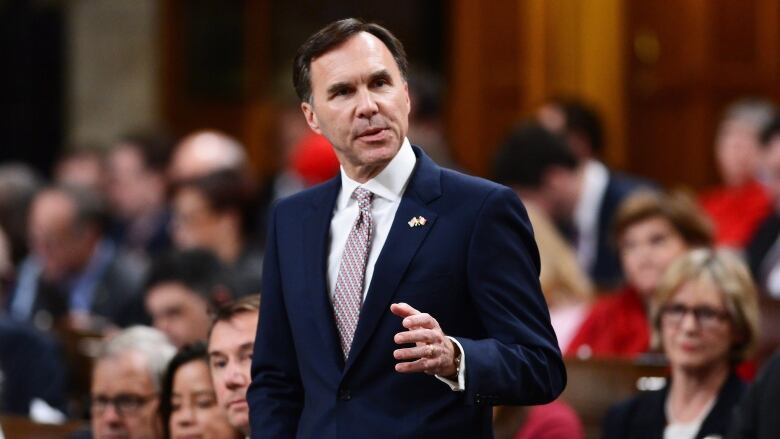The budget's gender-based analysis forgot to look at one thing men: Neil Macdonald
Men are falling behind in education and losing their jobs in the resource and manufacturing sectors

In last week's federal budget, which brimmed with worthiness, the Trudeau government announced its determination to identify how its spending "affect(s) men and women differently."
Utterly sensible, on the face of it.
While some, particularly in academia, regard gender as a "cisnormative" construct, the human race is in fact binary, and, as the budget's authors acknowledge, government policies have different impacts on men and women.
"Governments must understand to what extent their policy choices will produce different outcomes for all people," it says, inclusively.
Read past the first few paragraphs, though, and "all people" quickly morphs into "women."

That shouldn't be terribly surprising. Our prime minister says he's a feminist, and he's determined to use the levers of governing to correct discrimination.
The budget's gender statement focuses on the gap in wages (women make 87 cents for every dollar made by men), on the gross underrepresentation of women in science, technology, engineering and mathematics (STEM) jobs, on the fact that men still enjoy most of the best positions in the private sector, on the lack of affordable daycare (single mothers fare worse than just about everyone else) and on the fact that women are more likely to experience poverty, violence and harassment, particularly if they are indigenous.
-
Liberals spend on training and innovation while holding line on most taxes
-
Revenge of the comment section: Where's the 'poor-sensitive' budget?
The government further promises a deeper dive into gender-based injustice with every succeeding budget.
All of which is fair, and worthy, and was accepted by the parliamentary press corps with approving nods.
Every liberal, after all, is raised to believe that male privilege is the anchor determinant in our society, and that being born male especially a white male confers possession of the keys to society's ignition.
And yet.
Here are a few things the budget's gender-based analysis ignores, and might be worth addressing next time:
Women do much better than men in school.
That wasn't the case even 20 years ago, butas Statistics Canada puts it: "Today, the situation is completely different. Education indicators show that women generally do better than men."
The gap begins in kindergarten, where girls earn better marks than boys, and continues right through university.
"More girls than boys earn their high school diploma within the expected timeframe, and girls are less likely to drop out. More women than men enrol in college and university programs. A greater percentage of women leave these programs with a diploma or degree."
If that trend continues, and there is no reason to believe it won't, it isn't hard to see what lies ahead: an increasingly uneducated and unemployable male population.

"It is quite troubling that increasing numbers of young men are dropping out," says Philip Cross, former chief economic analyst for Statistics Canada. "They don't tend to do well in public school, and they're constantly told that if you don't go to university, you might as well not be in our society, and they know they probably aren't going to university, so they just drop out. An increasing number of men are not in the labour force and not going to school. This is not good."
Women have not yet caught up to men in the private sector, but they own the public service, by far the single biggest employer in the country.
According to Statistics Canada, women not only comprise 71 per cent of Canada's 4.1 million public sector jobs at all levels of government, but "gender parity now exists in the public sector with respect to women's representation in leadership positions."
Meaning that while women are still a designated group for the purposes of preferential hiring in the public service, they now have most of the jobs and at least half of the most senior jobs.
Cross puts it rather bluntly: "Women are overrepresented in government, and government jobs are the best jobs. Best job security, best pension benefits, best everything."
Further, he says, women now dominate the feeder positions for all the most senior jobs in government.
The overwhelming majority of people who have lost their jobs in the resource sector out west and the manufacturing sector, mostly in Ontario, are men.
As Springsteen sang, these jobs are going, boys, and they ain't coming back.
"There is a certain type of man who you wanted in the oil sands, out of town, blowing things up," says Cross. "Those people still exist, and now they are jobless, and what do we do with them now?"
Exact figures are difficult to find, but Janice MacKinnon, a university professor and former NDP finance minister in Saskatchewan, says it's a "staggering number." And those jobs that do come back will demand higher skill levels.
She notes there is absolutely nothing in the budget's gender-based analysis about those jobs, or what to do about their disappearance.

"Where's the strategy on that?" she asks. "If you are going to look at gender, that's fine, but there are areas where boys and men are struggling, and they need to be documented, too."
MacKinnon even goes so far as to say that being a white male entering the current job market is a disadvantage.
Cross puts it another way: "Historically, our economic system has favoured men, but the trend is in the opposite direction."
He would dearly like someone to ask the government why none of its gender-based analysis addressed any of the forgoing.
So I wrote one of the prime minister's senior advisers to ask.
The reply: "It is a reasonable question to ask."
But, um, no answer.
This column is part of CBC'sOpinion section.For more information about this section, please read thiseditor'sblogandourFAQ.












_(720p).jpg)


 OFFICIAL HD MUSIC VIDEO.jpg)
.jpg)



























































































